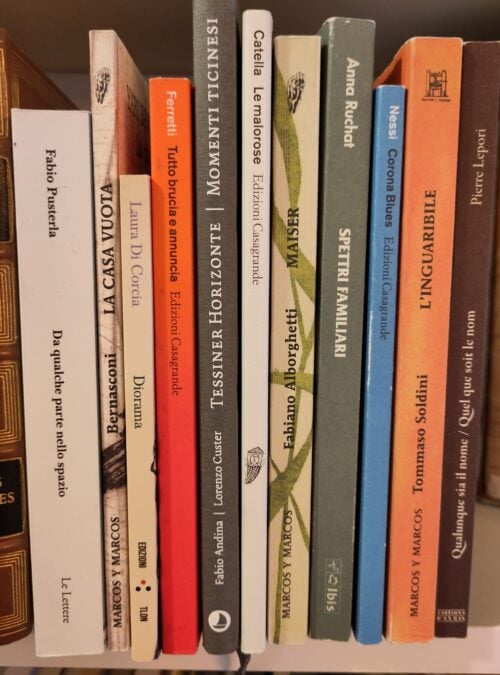Read Manzoni/Wo-Dú Manzoni. Read I Promessi sposi in Beijing
Author: Beatrice Nava, Leiden University

Leggo Manzoni/Wo-Dú Manzoni. Leggere I Promessi sposi a Pechino is a collaboration between the Department of Classical and Italian Philology at the University of Bologna and the Faculty of Foreign Languages at Peking University, under the scientific responsibility of Professors Paola Italia and Mo Cheng. It intends to develop an open, collaborative and scientific edition of Manzoni’s novel in a digital format, complete with the Chinese translation.
The aim is twofold: on the one hand, to promote reading of the novel in the accessible form (enriched with contextual information that only a digital edition can offer) and to raise awareness of Italian literature in China; on the other, to experiment with a peer-to-peer teaching model in which Italian and Chinese students (equal in number) will collaborate on the XML/TEI encoding for online publication of the translated text. Indeed, the project envisages an initial outgoing exchange phase, during which students from the Scholarly Editing and Digital Textuality course taught by Paola Italia as part of the DHDK (Digital Humanities and Digital Knowledge) course at the University of Bologna will join their colleagues from the four-year Italian language and literature course in Beijing to work together on encoding the chapters of the first volume of the novel. This phase will be followed by a second meeting during which a group of Chinese students will visit the University of Bologna to consolidate the exchange and to test the accuracy and usefulness of the encoded material, as well as the functionality of the digital edition.
The project is an enhancement and extension of the Leggo Manzoni digital environment developed by the FICLIT department at the University of Bologna (scientific directors Paola Italia and Francesca Tomasi; designers Paola Italia, Beatrice Nava and Ersilia Russo) in collaboration with the DHARC Digital Humanities Advanced Research Centre at the same university. The environment, developed as part of the PRIN 2017 project Manzoni Online: unpublished manuscripts and documents, tradition and translations, coordinated by Giulia Raboni (University of Parma), currently allows users to read the full text of the 1840-42 edition of I promessi sposi accompanied by forty critical comments (Leggo Manzoni), ten translations in eight languages (English, Spanish, French, German, Dutch, Polish, Russian and Chinese: Traduco Manzoni) and the digitisation and metadata of the printed original of the Quarantana, with in-depth studies of the cartoons (Vedo Manzoni).
Leggo Manzoni therefore allows us to appreciate the novel in different ways, reading it on several levels, from the critical to the visual, but it also offers an opportunity for research and the application of innovative digital methodologies and technologies for encoding, integrating and aligning texts. In particular, the implementation of the section devoted to translations, to which the new project will add the Chinese component, has enabled Mariia Levchenko, responsible with Giulia Menna for the development of the Leggo Manzoni application and a student at the University of Bologna, to study the application of algorithms for aligning translations with the original text in the creation of a multilingual digital edition (MDE), through the design of an automated pipeline for the creation of this type of digital edition, which will make it possible to overcome the limitations of the algorithms currently used when applied to the translation of literary texts.
The aim of these projects is therefore not only to disseminate Manzoni’s text in a new form, but also to provide training and develop skills in digital marking and metadata, as well as raising awareness of the characteristics of digital text, fostered by exchange, encounters and shared experimentation. In fact, thanks to the skills acquired by the students involved, the new platform can be updated and improved in the future to accommodate other texts of Italian literature that have not yet been translated or are not widely available in China.
During the Leggo Manzoni/Wo-Dú Manzoni. Leggere I Promessi sposi a Pechino (Reading I Promessi sposi in Peking) project, which will begin next spring and end in 2026, the same translation function will be implemented in order to host the Chinese text of the novel (in particular the translation edited by Professor Zhang Shihua: Alessandro Manzoni, Zhang Shihua张世华 (translator). Yuehun fufu约婚夫妇. Nanjing: Yilin译林出版社 Publishing House, 1998. ISBN: 9787805678603). And if translating and exporting the story of Renzo and Lucia is not a new operation – just think of the considerable circulation of translations even before Manzoni made peace with his text and published the Quarantana version (cf. Carmela Marranchino’s contribution here on Italianbooks: Marranchino 2021: https://www.newitalianbooks.it/it/in-altre-lingue/alessandro-manzoni-in-altre-lingue/) – there is no doubt that the medium, the methods and the teaching and research objectives are new. The intentions are perhaps not entirely new: to allow the text to speak to many, and to continue to constitute a point of access to nineteenth-century Italian literature and language for those who wish to approach an author who left deep traces in both these spheres.
The project will culminate at the University of Bologna and the Italian Cultural Institute in Beijing in March 2026 with the presentation of the new Leggo Manzon-Wo-Dú Manzoni platform at a face-to-face and online event that will prepare for, and in a sense anticipate, the celebration of the two-hundredth anniversary of the printing of the first edition of the novel (1827-2027).
So, all that remains is to wish the whole team a safe journey and congratulate it on a job well done, as well as thanking the author once again for a text that remains alive and full of potential.
Beatrice Nava is a postdoctoral researcher at the Huygens Institute (Royal Netherlands Academy of Arts and Sciences) in Amsterdam and a lecturer in Italian literature at Leiden University. She works on scientific digital editions and author philology, with a particular interest in the work of Alessandro Manzoni, the subject of her doctoral thesis (University of Bologna: Il Conte di Carmagnola dall’ultima stesura autografa alla stampa: una nuova edizione critica e un modello per un’edizione digitale).










